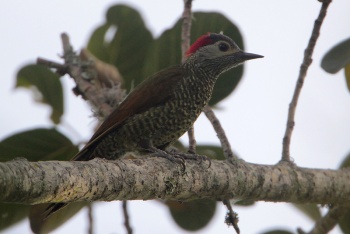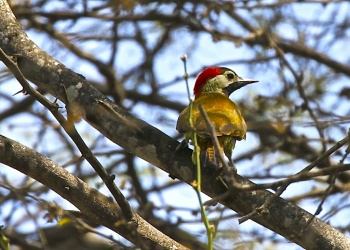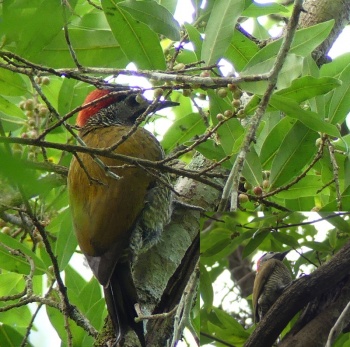- Colaptes rubiginosus
Piculus rubiginosus
Includes Bronze-winged Woodpecker (or Bronzed Woodpecker)
Identification
18–23 cm (7-9 in)
- Olive upperparts
- Olive barred underparts
- Face mostly whitish, male has red moustachial strip
- Crown slaty on top, with red on rear
Distribution
Subtropical Mexico to northwest Brazil.
Bronze-winged Woodpecker, C.r. aeruginosus, formerly a full species, is the most northerly subspecies (northeast Mexico), and most accessible to birders coming from the USA (Texas).
Taxonomy
It was formely placed in the genus Piculus.
There is data that indicates that this species will be split in the future, but which subspecies goes where is still unclear.
Subspecies

Photo © by Greg Lavaty
El Cielo Biosphere Reserve, Tamaulipas, Mexico, November 2009
19 subspecies are recognized[1].

Photo © by Raul Padilla
San Bartolo Tutotepec, Mexico, May 2010
- C. r. aeruginosus (Bronze-winged): Eastern Mexico (Tamaulipas to Veracruz)
- C. r. yucatanensis: Southern Mexico (Oaxaca) to western Panama
- C. r. alleni: Santa Marta Mountains (north-eastern Colombia)
- C. r. buenavistae: Andean slopes of eastern Colombia and eastern Ecuador
- C. r. tobagensis: Tobago
- C. r. trinitatis: Trinidad
- C. r. meridensis: North-western Venezuela
- C. r. deltanus: North-eastern Venezuela (Delta Amacuro)
- C. r. guianae: Eastern Venezuela and adjacent Guyana
- C. r. paraquensis: Mountains of south-central Venezuela
- C. r. rubiginosus: Mountains of north-central and north-eastern Venezuela
- C. r. viridissimus: Tepuis of southern Venezuela (high plateau of Auyán-tepui)
- C. r. nigriceps: Acari Mountains (southern Guyana and adjacent southern Suriname)
- C. r. gularis: Colombia (Central and Western Andes)
- C. r. coloratus: Extreme south-eastern Ecuador and north-central Peru
- C. r. chrysogaster: Central Peru
- C. r. canipileus: Central and south-eastern Bolivia
- C. r. tucumanus: Southern Bolivia to north-western Argentina (south to Tucumán)
- C. r. rubripileus: Extreme south-western Colombia to western Ecuador and north-western Peru

Photo © by Stanley Jones
Chaparrí Lodge, Lambayeque Department, Peru, November 2013
The first of these subspecies is treated as a full species by some authorities under the name of Bronze-winged Woodpecker (Piculus aeruginosus), while the rest then would keep the name of Golden-olive Woodpecker. Opus has not followed as the majority of world wide checklists still treat these as conspecific.
Habitat
Finca at 1700 meters on the east slope of the West Andes. Canopy and edges of rain forest, next to semi-open areas, shady gardens.
Behaviour
Breeding
Lays 2 to 4 eggs in a cavity high in a tree. Both adults are responsible for the care of the young, which fledge after about 24 days.
Diet
Usually feeds high in the canopy feeding on insects and larvae. Occasionally found feeding on low stumps at forest edges.
References
- Clements, J. F., T. S. Schulenberg, M. J. Iliff, D. Roberson, T. A. Fredericks, B. L. Sullivan, and C. L. Wood. 2016. The eBird/Clements checklist of birds of the world: v2016, with updates to August 2016. Downloaded from http://www.birds.cornell.edu/clementschecklist/download/
- SACC proposal to transfer this species to genus Colaptes
- BF Member observations
- Whatbird
Recommended Citation
- BirdForum Opus contributors. (2024) Golden-olive Woodpecker. In: BirdForum, the forum for wild birds and birding. Retrieved 9 November 2024 from https://www.birdforum.net/opus/Golden-olive_Woodpecker
External Links
GSearch checked for 2020 platform.







